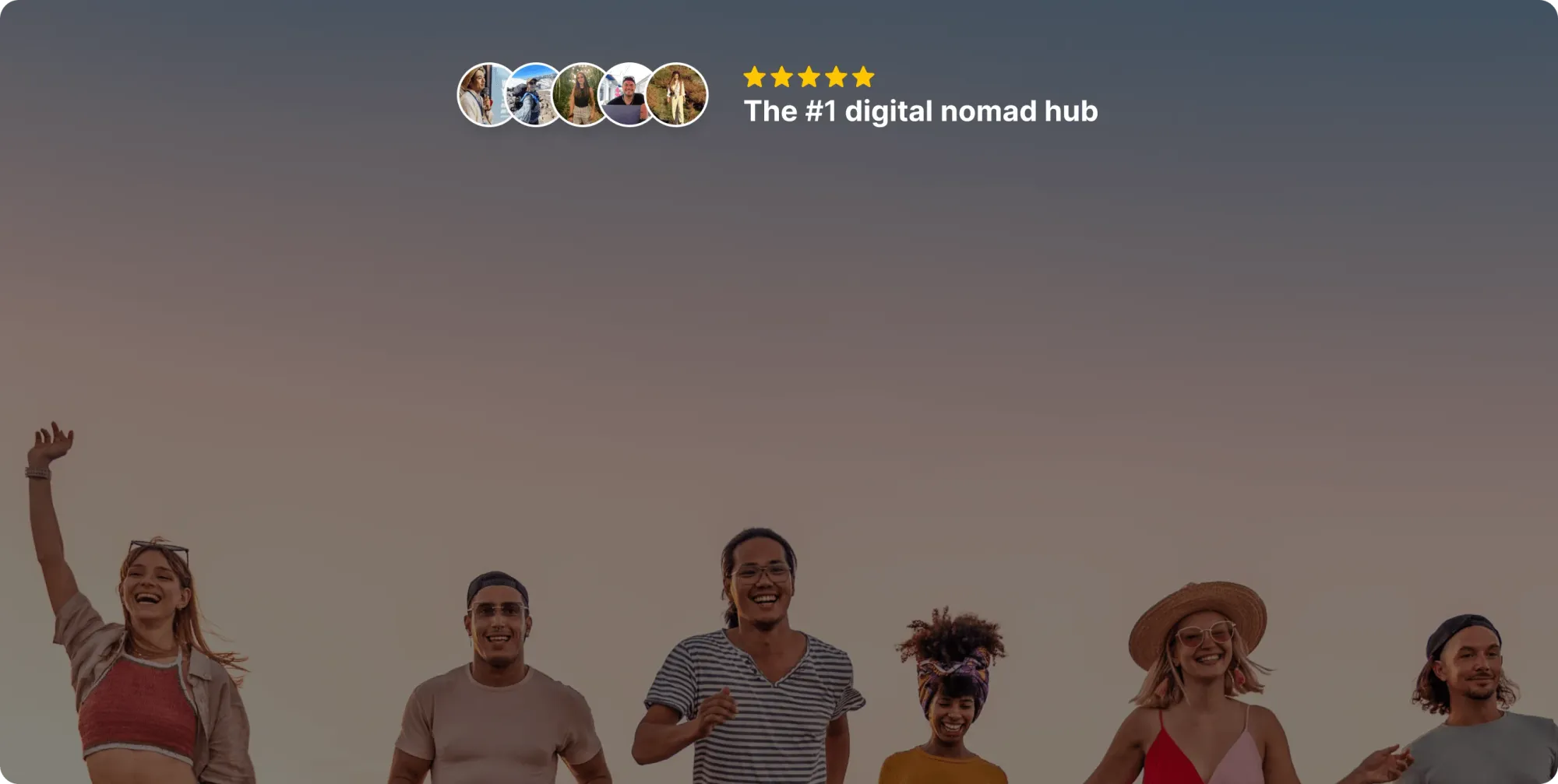How to Become a Digital Nomad

A digital nomad is someone who is able to carry on their work remotely while traveling the world. They are remote employees, freelancers, or entrepreneurs who have a passion for travel and are able to earn an income while hopping from one country to another.
Here's our own step-by-step guide on how you can join this location-independent workforce and become a digital nomad yourself.
The Benefits of Becoming a Digital Nomad
Embracing the digital nomad lifestyle is a chance to improve both your personal and professional life. You'll reach location independence, which will give you the freedom to choose where you live and work while immersing yourself in diverse cultures and potentially reducing your living costs if you wish to. For many, this flexibility often leads to a better work-life balance, as you will be able to design your day around your personal preferences and passions.
But that's not all. Being a digital nomad opens up professional opportunities, enabling you to work for companies hiring remotely or running location-independent businesses. You'll meet wonderful people and engage with communities that will enrich your social life, while the ability to pursue hobbies and passions will become seamlessly integrated into your daily routine.
This dreamy lifestyle is not only achievable but within everyone's reach. You just need the right planning. So, let's just dive right into it.
1. Review your current life and work situation
Before embarking on your digital nomad journey, it's crucial for you to understand your current situation both in terms of personal life and work. This self-assessment will help you determine if the digital nomad lifestyle aligns with your personal goals, values, and circumstances. Take time to reflect on various aspects of your life and consider the following:
- Evaluate your career: Are you satisfied with your current job? Can your work be done remotely? What skills do you have that are in demand for remote work?
- Assess your finances: Do you have enough savings to support a transition? How will your income and expenses change as a digital nomad?
- Consider your relationships: How will becoming a digital nomad affect your personal relationships? If you are in one, are you prepared for potential long-distance relationships?
- Reflect on your personal goals: What do you hope to achieve by becoming a digital nomad? How does this lifestyle align with your long-term life goals?
- Examine your adaptability: Are you comfortable with change and uncertainty? How well do you handle new environments and cultures?
Establishing your "why" you want to become a digital nomad is a fundamental step in shaping your digital nomad experience and ensuring long-term success in your nomad journey. By defining your purpose, you'll have a strong foundation to guide your decisions and keep you motivated during challenging times on the go. To determine if becoming a digital nomad is the right choice for you, try these two little exercises:
- Visualize your lifestyle: Envision your ideal work-travel balance, including potential alternative lifestyles like living in a van or living a slow-paced island lifestyle. Create a detailed mental picture of your daily routine, work environment, and leisure activities in various locations you'll be visiting.
- Choose your nomad type: Determine if you want to be a full-time traveler vs a part-time nomad, a slow mad vs a fast traveler. Make sure to consider factors like your work commitments, personal relationships, and desired level of stability.
2. Find a remote-friendly career path
Once you have assessed your current situation, it's time to understand how you are going to financially sustain yourself while traveling. Based on your career stage and employment type, you'll have mainly two possibilities:
Negotiating remote work arrangements
If you are employed by a company and you plan to retain your current job while working remotely, you'll have to negotiate this arrangement with your boss. You'll have to address potential concerns about communication, productivity, and security upfront, as well as demonstrate how you can maintain (or even enhance your performance remotely) while considering factors like time zone differences, necessary remote work setup, and handling sensitive information. Be also prepared to discuss compliance and tax issues, as working from different countries can (and will) have legal implications for both you and your employer.
Here's what to do in this case:
- Assess remote work feasibility: Evaluate your job responsibilities and how they can be performed remotely. Consider any potential challenges and prepare solutions in advance.
- Gather evidence: Prepare quantitative evidence demonstrating your productivity in a remote setting. This could include past performance metrics or examples of successful remote work periods.
- Address concerns: Anticipate and prepare responses to potential security concerns or issues with sensitive information. Be ready to discuss how you'll handle these aspects while working remotely using VPNs or similar tools.
- Consider time zones: Propose a plan for managing time zone differences and maintaining synchronous communication when necessary. This shows your commitment to staying connected with the team.
- Research legal implications: Understand local labor laws and tax and compliance considerations for working abroad. For instance, some US companies restrict W-2 employees from working overseas for tax reasons, so ask if you can switch to a 1099 independent contractor.
Making a career change or shifting to self-employment
If you are already self-employed or a freelancer, the transition to remote work won't be as painful as you'll already have a degree of flexibility. You'll have to find a way to make it work, but you'll have a good starting point.
If you instead are employed by a company and your boss is not willing to make remote work arrangements, you'll have to make a career change or switch to freelancing or self-employment. Whichever your career choice will be, these are the steps you can follow to secure a remote-friendly career:
- Conduct a skills audit: Assess your current skills and identify areas for improvement, focusing on in-demand remote jobs like coding, digital marketing, SEO, or UX/UI design. Create a comprehensive list of your hard and soft skills, ranking them based on proficiency and market demand.
- Research in-demand jobs: Explore popular digital nomad careers in information technology, web design, or consulting. Browse fully remote job boards and freelance platforms to identify trending skills and industries that align with your interests and abilities.
- Invest in learning: Sign up for online courses to enhance your skill set and stay competitive in the gig economy. Consider platforms like Skillshare or Udemy, or specialized coding bootcamps to acquire new skills or deepen existing ones.
- Develop soft skills: Focus on improving time management, networking, and adaptability. These skills are crucial for success in remote work settings.
3. Create a realistic budget and financial plan
Proper financial planning will get you far and will ensure that you have a stress-free and successful nomadic lifestyle. As a digital nomad, your financial situation will be unique, requiring careful consideration of various aspects like fluctuating income, varying living costs across destinations, and unexpected expenses.
Developing a budget that accounts for both your work and travel needs will be essential. This includes factoring in costs for accommodation, transportation, insurance, and emergency funds. Here's how you can create your financial plan:
- Research living costs: Investigate the cost of living in potential digital nomad hubs. Use resources like Nomad List and Numbeo to compare expenses across different cities and countries.
- List all potential expenses: Factor in travel insurance, accommodation, and visa requirements. Create a comprehensive spreadsheet that includes both fixed costs (like insurance) and variable expenses (like food and entertainment) for each potential destination.
- Set up digital nomad-friendly banking: Open a bank account for digital nomads, such as Wise, for easy international transactions. Research the best options for low-fee currency exchanges and international withdrawals.
- Choose a budgeting tool: Select a budgeting app to track expenses and income. Consider options like YNAB, Mint, or Revolut that offer features tailored to international travelers and multiple currencies.
- Build an emergency fund: Set aside money in a high-interest savings account to cover unexpected costs or income gaps. Aim for at least 3-6 months of living expenses to provide a safety net.
4. Choose your digital nomad destinations
Selecting the right locations will greatly impact your travel experience. The choice of a suitable destination will affect your quality of life, work productivity, and overall satisfaction, so make sure to carefully pick your places.
When evaluating potential digital nomad locations, consider factors beyond just the cost of living and internet reliability. Look into the local culture, safety, healthcare systems, and the presence of digital nomad communities. Many countries now offer digital nomad visas, which can provide a more stable and legal framework for long-term stays. Research these options and consider how they align with your work and travel goals. These are some things you can do when choosing the right location:
- Create a destination wishlist: Research visa requirements for countries you're interested in. Prioritize destinations based on factors like work-life balance, cultural interests, and personal growth opportunities.
- Analyze key factors: Consider location safety, cultural events, and entertainment activities for each potential destination. Use resources like the Global Peace Index and digital nomad forums to gather comprehensive information.
- Engage with other nomads: Look for destinations with thriving digital nomad hubs to ease your transition. Engage with nomads to get insider tips and make connections before arrival.
- Evaluate communication barriers: Consider potential language fluency issues and how they might affect your work and daily life. Research language learning resources and local language exchange opportunities in your target destinations.
- Research government initiatives: Look for countries with favorable policies for digital nomads, including dedicated digital nomad visas or tax incentives.
5. Prepare for travel and visas
Before departing, you want to ensure you have all the necessary documents and preparations in place for a smooth transition to the nomadic life. If you decide to go to places where a digital nomad visa is available, you'll need to carefully research visa requirements, as they may have specific income or insurance requirements. Additionally, you'll have to consider how you'll manage your health insurance, taxes, and other legal obligations while abroad. Here's a useful checklist for you:
- Check your passport validity: Ensure your passport is up-to-date and valid for your intended travel period. Many countries require at least six months of validity beyond your planned stay.
- Research visa options: Investigate tourist visas, work visas, and specific digital nomad visa programs for your chosen destinations. Each country has different requirements and restrictions, so thorough research is crucial.
- Obtain the necessary documents: Gather bank statements, proof of income, and other required paperwork for visa applications. Having these documents organized and readily available will streamline the application process.
- Secure digital nomad insurance: Purchase comprehensive travel insurance and health insurance, considering options like SafetyWing or Genki insurance that cater specifically to digital nomads.
- Organize your digital documents: Set up a cloud storage platform like Google Drive or iCloud to securely store important documents and information. This ensures you have access to crucial documents no matter where you are in the world.
6. Find digital nomad accommodation options
As a remote worker, you will need a comfortable living space that also supports your work needs. Fortunately, digital nomads have access to a wide range of housing options designed specifically for their lifestyle. Here are the types of accommodation to consider:
- Private accommodations: This is the most popular option among nomads and includes options like serviced apartments, furnished local apartments, or house rentals on platforms like Flatio and Airbnb. These offer privacy and often a more home-like environment.
- House sharing: Sharing a house or apartment with other digital nomads or locals is a cost-effective option that also provides social interaction.
- Coliving spaces: Purpose-built for remote workers, colivings offer a blend of private living areas and communal workspaces, with a particular focus on community building.
- Hotels and hostels: While traditionally for short-term stays, many hotels and hostels on platforms like Booking.com (or Agoda in Southeast Asia) now offer extended stay options catering to digital nomads.
- Home exchanges: Platforms like Swaphouse allow you to swap homes with other digital nomads, providing a convenient and often cost-effective accommodation option.
- House sitting: Taking care of someone's home while they're away can provide free accommodation in exchange for responsibilities like pet care or home maintenance. You can find this opportunity on platforms like Trustedhousitters.
Whatever accommodation you choose, you might want to consider factors such as WiFi and internet connectivity, availability of a suitable workspace, proximity to coworking spaces or cafes, and the overall cost of living in the area. Your living situation can greatly impact your productivity and overall experience as a digital nomad, so you should make sure to take the time to find an option that suits your needs and preferences.
7. Adjust your lifestyle to your new reality
Once you have prepared your documents, found your accommodation, and reached your destination, it's finally time to enjoy the lifestyle and adapt to this new lifestyle. This requires some lifestyle changes that go beyond just changing your work location. You'll need to embrace a new way of living that prioritizes flexibility, minimalism, and cultural immersion. This transition often involves downsizing your belongings, creating new routines, and developing a more sustainable approach to your daily life.
As a digital nomad, you'll need to find the right balance between work responsibilities and the desire to explore new places, which requires discipline and effective time management. On top of that, you'll have to consider how your lifestyle choices impact the environment and local communities you visit. Don't worry, it's a beautiful journey, the one you are getting into. These are some tips that will help you get up to speed with this new change:
- Downsize belongings: Simplify your life by reducing possessions to what's essential for travel and remote work. This process of minimizing your material footprint can be liberating and practical for a nomadic lifestyle.
- Create a productive routine: Establish clear work and leisure boundaries to maintain a healthy work/life balance. This routine should be flexible enough to adapt to different time zones and work environments.
- Adopt sustainable practices: Minimize your carbon footprint by reducing plastic consumption and shopping locally. Be considerate of how your lifestyle choices impact the places you visit.
- Give back: Look for volunteer work opportunities or ways to support the local community in your destinations. This can provide a sense of purpose and help you connect more deeply with local cultures.
- Stay healthy: Develop habits to maintain your physical and mental well-being while traveling. This includes regular exercise, healthy eating, and stress management techniques.
8. Build a support network
The digital nomad lifestyle can be infamously isolating at times, so it's important to build a strong support network around you in order to combat loneliness and foster professional growth. This support network will serve multiple purposes: it will provide emotional support, create opportunities for collaboration and skill-sharing, and help you navigate the challenges of living and working in new environments.
Fortunately, there are plenty of digital nomads like you out there and you don't have to face these challenges all by yourself. Here's what to do to make sure you build strong and long-lasting connections:
- Join online communities: Become a member of digital nomad forums, Facebook groups, Reddit communities, and digital nomad communities like us at Freaking Nomads. Participate actively by sharing your experiences, asking questions, and offering support to others.
- Attend local events: Look for networking events and meetups in your destinations to connect with other nomads and locals. Use Facebook Groups searching for "Digital Nomads in..." to find relevant gatherings and expand your social circle.
- Stay connected with your close ones: Maintain regular contact with family and friends back home to keep your support base strong. Schedule regular video calls and share updates with them to stay involved in each other's lives.
- Use co-working spaces: They are great because they offer community events, skill-sharing workshops, and social gatherings that can help you build connections.
- Join remote-work travel programs: Coliving programs, workcations, or similar digital nomad organizations often offer structured support, mentorship, and opportunities for collaboration with fellow nomads.
Make the leap and become a digital nomad today
And that's it. You now have all you need to become a digital nomad. It's a journey that requires courage, planning, and determination, but it's okay to start small and gradually transition into this way of life.
Stay focused on your goals, remain flexible, and don't be afraid to take calculated risks. Embrace the opportunity to immerse yourself in new cultures, expand your professional network, and continuously learn and grow from your experiences if you want to thrive as a digital nomad.
And be prepared to adapt your strategies as you go, so you can learn from both successes and setbacks.
With the right mindset and preparation, you will join a growing community of digital nomads and experience the freedom and adventure that come with this unique lifestyle. Take the first step today, and open yourself up to a world of possibilities.

Join our global
digital nomad community
Join us for free
Freaking Nomads is supported by you. Clicking through our links may earn us a small affiliate commission, and that's what allows us to keep producing free, helpful content. Learn more





 Travel tips, hacks, and news
Travel tips, hacks, and news Exclusive travel discounts
Exclusive travel discounts Offers and promotions
Offers and promotions Digital nomad inspiration
Digital nomad inspiration Latest articles form our blog
Latest articles form our blog